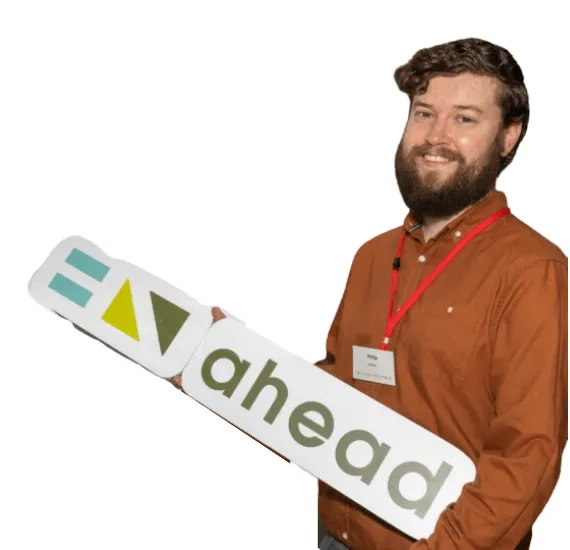Self-Advocating at Work
5 Jul 2024, 13:38
-min.webp)
My name is Philip Carroll, I am a Project Officer on the WAM Programme here in AHEAD. I’ve been here for just over a year now but before I came to work for AHEAD, believe it or not, I actually took part in the WAM Programme myself as a newly qualified graduate fresh out of college!
I did a WAM Placement with the HSE in 2018 for one-year, fast forward a few years and life has come full circle where I am now working on the other side of the table supporting other graduates who are like myself.
You might be wondering why am I telling you all this? Well one particular skill I have had to learn throughout my career and education to date is the skill of speaking up for myself when it comes to my disability. This is commonly known as ‘self-advocacy’.
Self-advocacy is a vitally important skill for all individuals to have, but especially more important for those of us whom have specific needs or accommodations in the workplace.
Going out into the workplace is daunting for everyone but add a disability into the mix and it can be even more daunting. This is where The WAM Programme excels, as it provides a comprehensive needs assessment to ensure that the appropriate reasonable accommodations and supports are identified and recommended to your employer. But what happens when you are out in the workplace, and you run into issues? This is where the important life skill of self-advocacy comes to the fore.
Self-advocacy is speaking up for yourself to get the supports that you need or are entitled to. This is especially important in the workplace, as employers will not always know what you need to ensure your disability is not a barrier to your participation in the workplace, if you do not tell them.
It is an important skill to learn in life, especially if you have a disability. Any manager, colleague, teacher, friend, or even family member cannot give us what we need unless we ask. We need to make the implicit, explicit. And asking is bloody difficult….at first! The more you do it, the better you will become at it. Additionally, the more you self-advocate, the more in-tune your colleagues will be about your needs and the less you will have to remind them.
A difficulty that I have experienced time and time again during my career is a change in my assigned manager. This is where the person I originally self-advocated my needs to is no longer my manager and I now have a new manager that I must start the whole process again as all the knowledge my previous manager had has been lost. This can be frustrating and time consuming, but no more frustrating than allowing for your needs not to be met.
Our work with self-advocacy is never done, but we get better at it. It is a vital skill that we must learn, and we learn by doing it again and again. This is self-advocacy. I leave you now with my tips for starting your self-advocacy journey.
TIPS FOR APPROACHING SELF-ADVOCACY
- Explain the rationale behind your request.
- Be assertive but respectful in your communication.
- Refer to your needs assessment (if you have completed one previously)
- Offer advice on what worked well or did not work well in the past.
- Be open to other alternative solutions.
- Read AHEAD’s How to tell Employers about your Disability: A Guide to Disclosure
- Seek advice from disability related organisations
- Know your rights. Go to www.ihrec.ie/your-rights for more information.
More information about WAM Programme
Here at AHEAD we run a work placement programme called The 'Willing Able Mentoring' Programme or 'WAM' for short. WAM aims to promote access to the labour market for graduates with disabilities and build the capacity of employers to integrate disability into the mainstream workplace. Employers collaborate with WAM to offer mentored, paid jobs exclusively for graduates with disabilities.
Since 2005, The WAM Programme has provided over 650 graduates with disabilities secured paid employment with a wide range of employers in many different areas. Some of the employers WAM work with are; Pfizer, Bank of Ireland, the Civil Service, Bord Na Mona, ESB and Allianz. We have had jobs in; Data Analytics, Business Analyst, QC Chemist, various Graduate Programmes, and Executive Officers in the Civil Service.
If you are a student or graduate with a disability, we strongly encourage you to register on our WAMWorks Database. This way, you will be informed of any job opportunities and also of GetAHEAD's free upskilling workshops and events.
If you see a WAM job opportunity that you like, complete your CV and then upload your CV to the WAMWorks Database. The employing company will review your application and if you are successful, they will invite you to interview. Please see our full list of WAM FAQs here.
Guest Blog Author: Philip Carroll - WAM Project Officer
A important tool for all people with a disability is to learn the skill of self-advocacy, the process of speaking up for yourself to get the supports that you need or are entitled to. Below you can start your self-advocacy journey by reading a testimonial from one of our former WAM graduates and current WAM Project Officer, Philip Carroll.

gradireland editorial advice
This describes editorially independent and impartial content, which has been written and edited by the gradireland content team. Any external contributors featuring in the article are in line with our non-advertorial policy, by which we mean that we do not promote one organisation over another.
